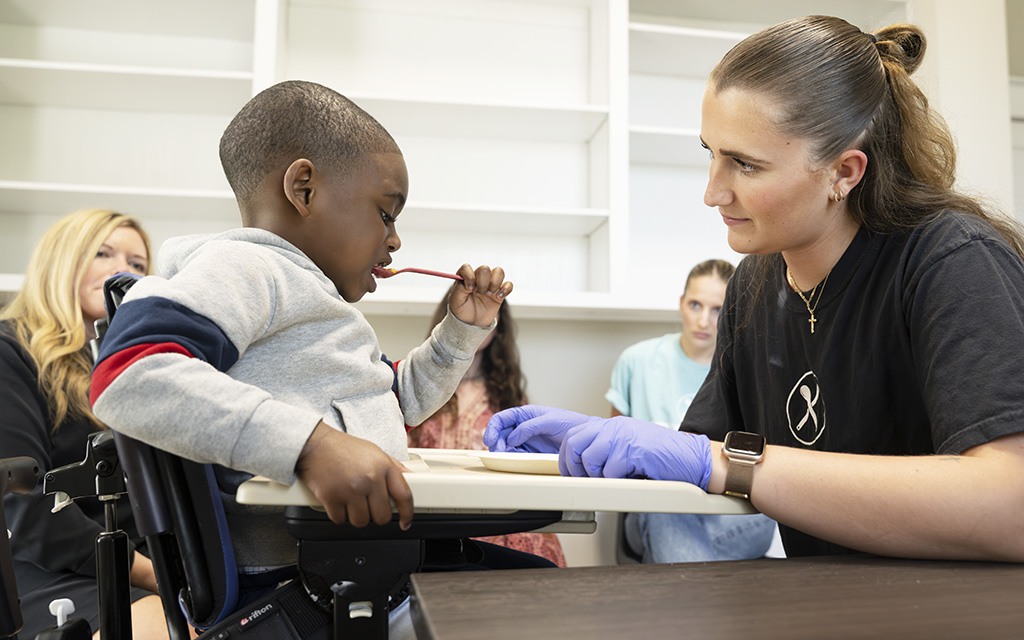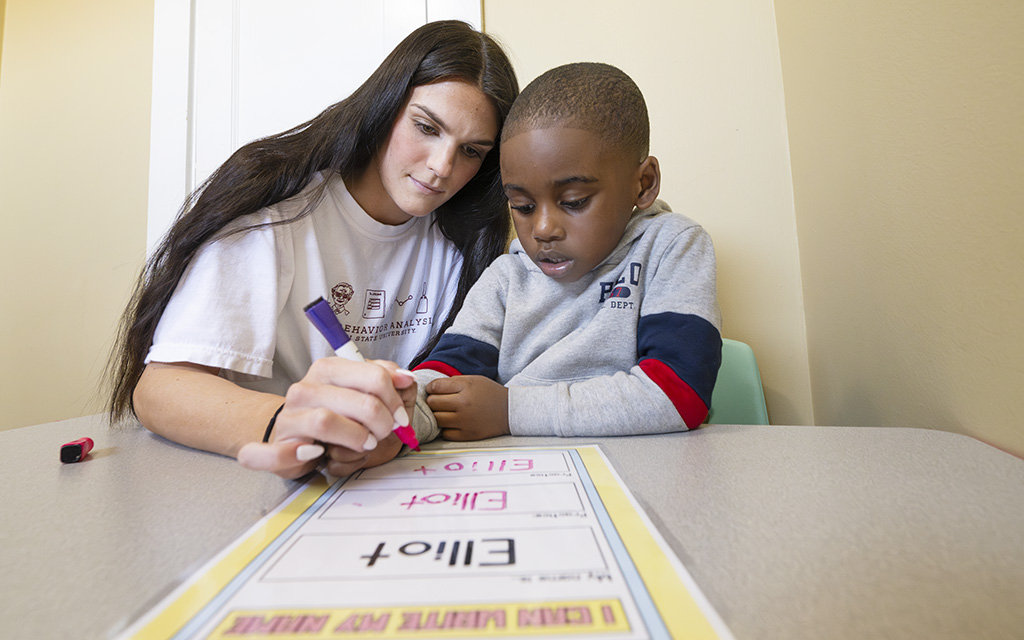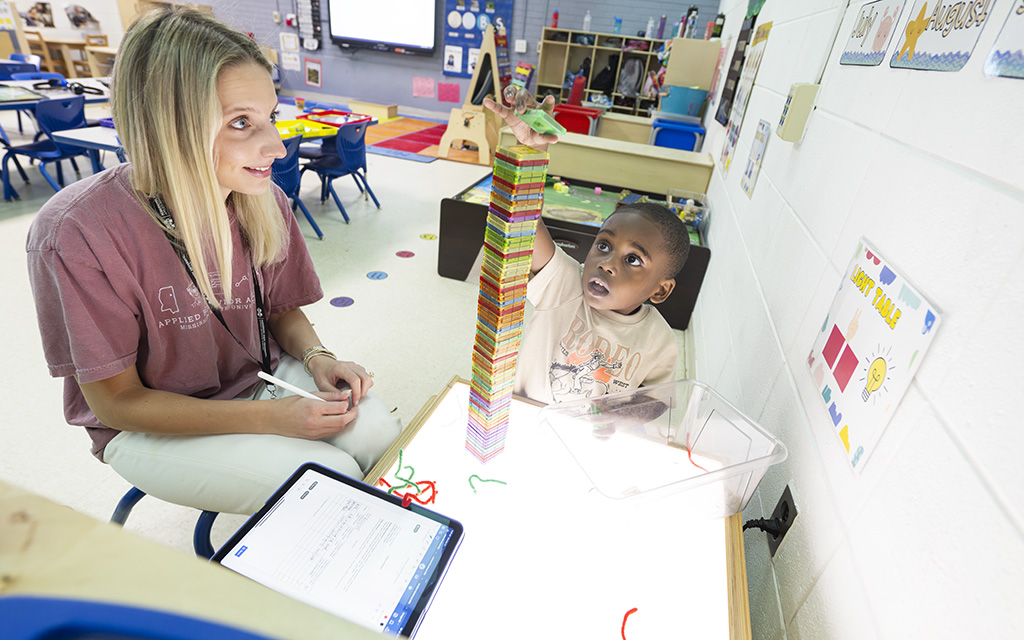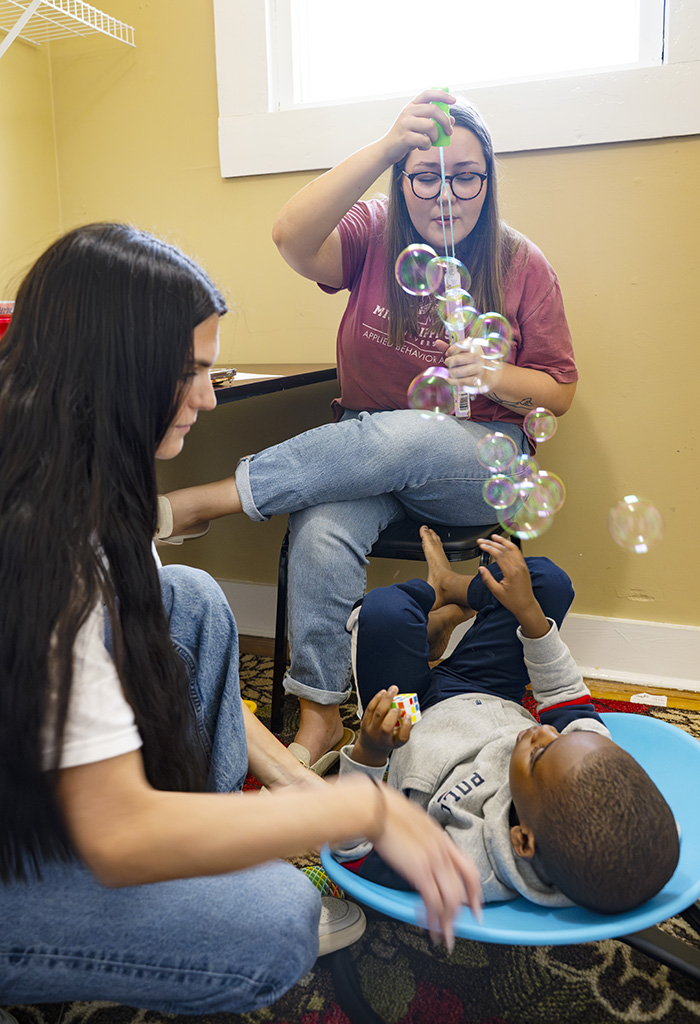
MSU grant increases access to behavioral health services in Mississippi communities
When Starkville kindergarten teacher Tynesha Elliott received her son’s autism diagnosis, she turned to Mississippi State University’s Autism and Developmental Disabilities Clinic and Pediatric Feeding Disorders Lab for support. Over the last two years, MSU’s applied behavior analysis faculty and graduate students have helped her son “tremendously” by delivering life-changing behavioral healthcare services.
“He has gotten so much better,” Elliott said. “One thing we’ve been working on is keeping him seated during lunchtime. Previously, he would not sit still at lunch, but now he will. The MSU team even goes into schools to help him and their other clients, which is a huge help for me as a teacher and as a mom.
“I can tell they care about my son and his wellbeing and how he is going to adjust later in life,” she continued. “They greet him like he is theirs. I want him to keep coming to MSU’s clinic as long as he can because I know he will get the best care.”
Elliott and her son benefit from living within a few miles of MSU’s Autism and Developmental Disabilities Clinic, allowing them to receive world-class services without the need to travel long distances. However, Mississippi faces a shortage of behavioral health service providers, especially in rural areas. With support from a $943,000 grant from the Health Resources and Services Administration, Mississippi State University faculty and students are on a mission to meet that need.
Awarded to MSU’s Applied Behavior Analysis program in the College of Education, the two-year funding addresses the practitioner shortage through stipends and support to ABA master’s students and existing providers who serve in rural areas of the state, allowing families across the state’s 82 counties to receive the same quality of care available to those who can easily visit the campus clinic.
ABA practitioners primarily serve clients diagnosed with autism or an intellectual or developmental disability. According to the U.S. Centers for Disease Control and Prevention, 1 in 36 children are diagnosed with autism nationally. ABA practitioners seek to improve the clients’ overall quality of life and independence by using techniques to modify behaviors and teach vital life skills. Hallie Smith, an assistant professor and ABA program coordinator, serves as the principal investigator for the project.
“Our state has less than one third of the workforce needed to provide childhood behavior-analytic services, which translates to long waitlists for families and children not getting the care they need,” Smith said. “With this grant, we are working to increase the number of providers and better meet the needs of children, adolescents and young adults in rural and underserved communities in Mississippi.”




The MSU-BRIDGE program allows children like this young client to access high quality, evidence-based services in their communities. Assistant Professor Hallie Smith, top left, instructs MSU graduate students who provide wrap-around services for this child at his local public school, as well as at the MSU Autism and Developmental Disabilities Clinic and MSU Pediatric Feeding Disorders Lab.
A Year of Success
The team experienced a successful first year of the grant “Bridging the Gap: Building a Comprehensive Training Program for Behavioral Health Service Providers in Rural Mississippi Communities,” or MSU-BRIDGE for short. Fifteen ABA second-year master’s students, were placed in community-based clinics in rural areas of the state, including McComb, Oxford, Starkville, West Point and Winona. Students also served in the Starkville Oktibbeha School District and Webster County School District.
Smith said nine of the 15 MSU-BRIDGE students from the first year are now employed full time at clinics in Mississippi, half in a rural setting.
“One of our goals was to increase the quality and quantity of eligible practitioners in the state, particularly in rural areas,” Smith said. “So, it’s really good to see that so many of our students stayed.”
The students were not the only ones who directly benefited from the grant project. Their clinic supervisors received stipends, professional development and funds to cover continuing education. Additionally, the MSU team met with each supervisor quarterly to provide feedback, resources and recommendations based on the students’ evaluations.
“Once you’re certified, it’s not often you have a professional in your field available to give you objective feedback,” Smith said. “Our supervisors have said that it’s helpful to get that feedback from an objective third party professional.
“I think it’s important to recognize that we wouldn’t be able to do any of this if we didn’t have the support of the current ABA practitioners in our state,” Smith continued. “While we do have a shortage of providers, we also have really great practitioners who allow us to continue our work.”

Mississippi State graduate students Hayley Rossiter, left, and Taylor Moore use playful techniques—like blowing bubbles—to help children stay engaged and build important skills during therapy. These small moments are part of a broader approach rooted in applied behavior analysis.
Coming Full Circle
With one more year of funding to go, Smith says the project is coming full circle. Current students are now being placed in clinics where their supervisors are former MSU-BRIDGE participants.
“It’s really neat because we already have a relationship with these alumni,” Smith said. “They know what our program is like, and they’re able to serve as really good mentors and supervisors for our current students.”
One such supervisor is MSU alumna Molly Rossiter, who is now serving as a Board Certified Behavior Analyst at Will’s Way Pediatric Behavioral Psychology in Hattiesburg.
“The MSU-BRIDGE program truly changed the course of my life and career,” Rossiter said. “The support, mentorship and hands-on experience I gained not only prepared me for the technical aspects of being a BCBA but also instilled a deep passion for serving families in Mississippi. The program opened my eyes to the incredible need for behavioral health services in our state and gave me the confidence to step into this role.
“Staying in Mississippi felt like the best way to give back to the community that has given me so much,” she continued. “I’m proud to now work as a BCBA at Will’s Way where I get to see firsthand how this work transforms lives.”
Smith hopes more students, like Rossiter, will choose to stay in the Magnolia State, thus increasing access for children and families to the care they need. Currently, MSU offers an ABA master’s degree and minor to prepare students to enter the field. And with a new ABA bachelor’s degree scheduled to launch in fall 2025, the university’s impact in the field is only expected to grow.
“The MSU-BRIDGE program is a testament to taking care of what truly matters—ensuring children and families in Mississippi have access to the behavioral health services they need,” Smith said. “By investing in our students and supporting dedicated practitioners, we’re building stronger and more supportive communities for those with disabilities and behavioral health needs.”
By Bethany Shipp, Photos by Beth Wynn
Advocating for Access

Nothing is harder for a parent than sensing your child has a developmental need but not knowing what it is. Being a vocal advocate for your child can make the difference in early detection, intervention and treatment for a variety of educational and behavioral needs.
Mississippi State University is working across the state—and, through our graduates, across the country—to increase access to these services. With experience researching and providing for these needs, MSU’s Hallie Smith, a licensed psychologist, board-certified behavior analyst, offers the following suggestions to help parents get started if they feel their child needs assessment or intervention.
- Be proactive. Parents can monitor their child’s progress toward appropriate developmental milestones to catch delays and advocate for their child as needed. There are many apps available that allow parents to easily track their child’s progress and stay on top of their development between pediatrician appointments.
- Talk to your child’s pediatrician. Talking to your child’s doctor about your specific concerns can be a good first step. You can request a list of providers, such as licensed psychologists, they would recommend for an evaluation. But remember, you don’t have to have a referral to get your child evaluated. Parents can call providers directly to request their child have an evaluation.
- Early intervention is important. Research indicates the earlier intervention is provided to a child, the more significant the outcomes of that intervention will be. It is important to note that for many developmental disabilities, like autism spectrum disorder and intellectual disability, there is no cure and these are lifelong diagnoses; however, many individuals with these diagnoses who receive high-quality, evidence-based interventions have excellent quality of life and can gain relevant functional skills to support their independence.
Visit www.chef.msstate.edu for more information about the Applied Behavior Analysis program or the Department of Counseling, Higher Education Leadership, Educational Psychology and Foundations.

